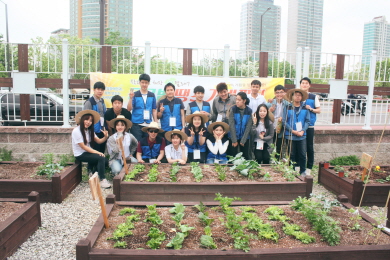
Donggubat, a social enterprise, is the organization that gathered these youths in a field on a rooftop to do farm work. The enterprise was established by four students from Hongik University to help people with developmental disabilities. The enterprise aims to boost the sociality of the disabled by growing crops at urban fields with their peers.
Currently running nine fields, around 60 pairs of disabled and non-disabled youths are participating. Each field has a distinctive theme based on subjects such as movie or painting. Together, the team for each field plans an activity that fits the theme. For instance, a team created a field in Gyeonghui Palace under the theme of tradition, and prepared a traditional rain calling ceremony.
“Coming to the fields and spending time with their peers is almost like a regular picnic for them,” said Noh Soon-ho, the representative of the company.
In addition to the field work, Donggubat also holds a campaign called “So Farm So Good.” This is a special event where the participants make soap out of the crops they produced and donate it to the socially vulnerable such as the homeless.
“The disabled students were thrilled beyond imagination, since they hardly ever experience someone thanking them,” Noh said.
According to Noh, learning to communicate is like learning a foreign language to the disabled. However, they usually do not have opportunities to continuously practice their communication skills, making it almost impossible for them to acquire these skills. What Donggubat does is to provide such opportunities.
However, unlike their current activities, in the beginning, Donggubat members were more interested in urban agriculture itself and the values derived from it.
“We simply thought that urban agriculture would be an enjoyable way to do some good to the society,” Noh said. “One of the values we found through farming was that people can get along while doing farm work. It naturally led us to think about people who have difficulty mingling in communities of the society.”
At first, many candidates such as North Korean defectors and members of multicultural families were considered for the Donggubat activities. However, studying the living conditions of the disabled and meeting one of them in the fields by chance, the members decided that the developmentally disabled are most in need of their activities.
After graduating from high school, most disabled youths struggle with employment. Therefore, the initial goal of the enterprise was to provide them with jobs. However, one remark from a mother struck Noh, providing a turning point.
“The mother asked me if I would remember her son, and I answered I would try,” Noh recalled. “Then she questioned ‘Would my son remember you?’ I said maybe. But her answer shocked me. ‘Of course he will. Could you ever forget your only friend?’”
For the student, Noh was his one and only friend. What the disabled needed was not only a job, but also a friend. After that incident, Donggubat focused on creating a program where the disabled and the non-disabled can communicate by working together. Noh emphasized that this also leads the disabled to getting a job, as the reason the developmentally disabled have difficulty getting hired is due to their lack of simple skills to communicate with customers and fellow workers, rather than lack of professional skills.
Despite the sense of fulfillment the members feel through the activities, it has been facing financial problems. Since Donggubat is not just a mere club activity but a company, it needs to make profit.
“To be honest, we are not really making any extra profit right now,” Noh confessed. “However, we are developing new models to move on to the next stage of the business.”
Despite the instability they are going through, Donggubat members say they are most motivated to continue and feel rewarded when they feel the service they provide is actually needed by people. They are even receiving demands from areas outside of Seoul.
“Presently, our program is limited to only Seoul,” Noh said. “But the ultimate goal of Donggubat is to expand the service allowing every disabled youth in the country to have an opportunity to experience our program.”
Reading the real demands of the disabled, Donggubat is working on developing its program to a stage where the activities lead to actual careers. When this stage is achieved, it will strive to provide an environment where the disabled can communicate with peers and train for a job at the same time to a wider range of people.
Yang Hae-in
allesy94@ewhain.net

